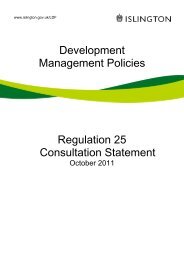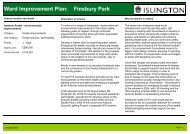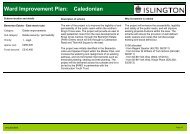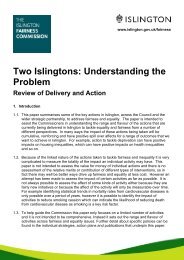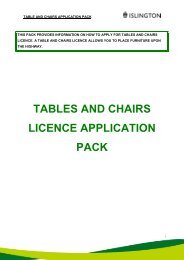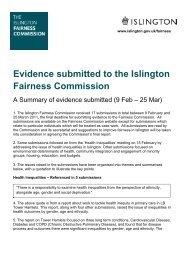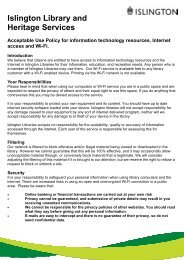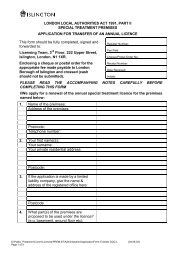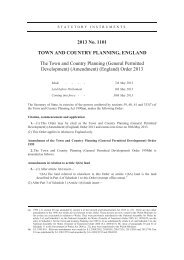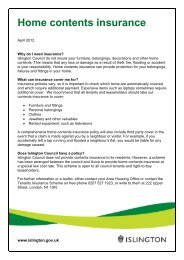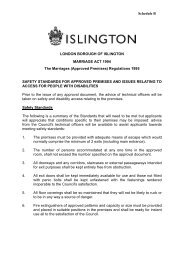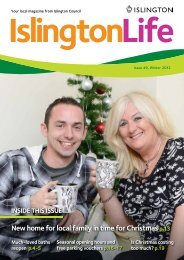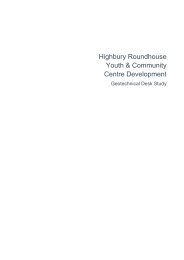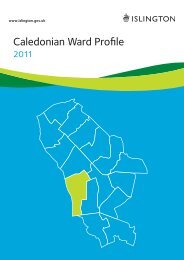Local Authority Support to People with No ... - Islington Council
Local Authority Support to People with No ... - Islington Council
Local Authority Support to People with No ... - Islington Council
Create successful ePaper yourself
Turn your PDF publications into a flip-book with our unique Google optimized e-Paper software.
Eligibility for funding from the Sojourner Project is restricted. Some groups fall out of the Sojourner<br />
remit, including failed asylum seekers and those on student visas. About 50% of applicants are<br />
ineligible; the project has had approximately 2000 referrals and of those around 890 have received<br />
the service, including men (from 30/11/09 – 15/06/11).<br />
Information sharing between local authorities and the voluntary sec<strong>to</strong>r was identified as an issue<br />
during the workshop. There needs <strong>to</strong> be greater awareness-raising <strong>with</strong> local authorities and<br />
voluntary sec<strong>to</strong>r organisations regarding the Sojourner Project, regarding who is eligible for support<br />
and how <strong>to</strong> apply for support from the service and how this interacts <strong>with</strong> eligibility for local authority<br />
support.<br />
Benefits of the project identified during the workshop included: reduced local authority costs and a<br />
quicker response <strong>to</strong> Domestic Violence Rule applications. It was recommended that organisations<br />
collect data on domestic violence cases they come in<strong>to</strong> contact <strong>with</strong> but are not eligible for Sojourner<br />
funding, in order <strong>to</strong> help develop appropriate policies and procedures.<br />
When the Sojourner Project ends in 2012 and is replaced <strong>with</strong> limited access <strong>to</strong> public funds for<br />
victims of domestic violence in this group, careful planning will need <strong>to</strong> take place <strong>to</strong> ensure local<br />
authority support is received instantly upon fleeing abusive situations.<br />
NB. The length of funding under the Sojourner Project is 50 working days, not 40 as stated on the<br />
information pack and Eaves Housing website. A person is entitled <strong>to</strong> 30 working days of<br />
accommodation and support <strong>to</strong> enable them <strong>to</strong> submit a Domestic Violence Rule application and 20<br />
working days post-submission.<br />
Henry St Clair Miller, NRPF Network/Isling<strong>to</strong>n <strong>Council</strong> – NRPF<br />
Connect<br />
This workshop provided an overview of the NRPF Network’s project <strong>to</strong> deliver a national database for<br />
NRPF cases. The work is funded by the NRPF Network and the UKBA. A steering group <strong>with</strong> local<br />
authority and UKBA representation is in place <strong>to</strong> inform system development. The database will be<br />
operational amongst the local authorities involved in the pilot by February 2012 <strong>with</strong> national-roll out<br />
<strong>to</strong> follow.<br />
The limitations of not having a centralised database have been known for many years. Better<br />
partnership work between the UKBA and local authorities is needed in order <strong>to</strong> identify and resolve<br />
cases more effectively. Secure data exchange will facilitate this working partnership and help moni<strong>to</strong>r<br />
outcomes.<br />
The workshop began by canvassing opinion on what people thought the ‘pros’ and ‘cons’ of a<br />
database for NRPF cases might be, participants were asked <strong>to</strong> provide one ‘positive’ and one<br />
‘negative’ comment each.<br />
In terms of the negatives, it was felt that people’s right <strong>to</strong> private life would be breached in relation <strong>to</strong><br />
privacy and data protection; it was raised that information held ‘would only be as good as the<br />
commitment of the people who input the data’; maintenance, ownership and costs were also raised<br />
as concerns.<br />
In terms of the positives, comments included ‘creating a common language and understanding’,<br />
transparency, ‘keeping people individual cases ‘alive’ and moving on’ and improved communication<br />
between organisations leading <strong>to</strong> ‘resolution of status’. From a strategic point of view, providing<br />
NRPF Network/British Red Cross Conference Report June 2011 12



